Navigating Workday Payroll Integration Testing Challenges.

Workday Payroll: Overcoming Integration Challenges.
A prominent life sciences company, renowned for its contributions to healthcare innovation and research, faced integration challenges while implementing a new payroll solution with Workday. The company encountered difficulties due to a lack of testing expertise, leading to delays and operational disruptions.
Impact:
The integration challenges had significant impacts on the life sciences company:
- Operational Delays: Inadequate testing expertise resulted in delays in integrating the new payroll solution with Workday, affecting payroll processing timelines and employee compensation.
- Compliance Risks: The lack of comprehensive testing raised concerns about regulatory compliance and data integrity, posing risks of non-compliance and potential penalties for payroll inaccuracies.
- Employee Dissatisfaction: Operational disruptions and payroll errors caused frustration among employees, leading to decreased morale and satisfaction levels within the company.
Root Cause:
The root cause of the integration challenges was attributed to the company’s lack of testing expertise in managing complex integrations with Workday. Insufficient knowledge and resources for testing payroll solutions hindered the company’s ability to identify and address integration issues effectively.
Mitigations for Testing:
To overcome the integration challenges and enhance testing expertise, the life sciences company implemented the following mitigation strategies:
- Testing Partnership: Formed strategic partnerships with testing consultancies specialising in Workday integrations and payroll solutions. These partnerships provided access to testing expertise and resources, augmenting in-house capabilities for comprehensive integration testing.
- Skills Development: Invested in training and up-skilling internal teams to enhance their knowledge and proficiency in testing Workday integrations and payroll solutions. Training programs and workshops were conducted to empower employees with the necessary skills and expertise.
- Test Environment Setup: Established dedicated test environments to simulate integration scenarios and conduct end-to-end testing of Workday payroll solutions. Test environments mirrored production environments, enabling thorough testing without impacting live payroll processes.
- Test Data Management: Implemented robust test data management practices to ensure the availability of realistic and representative data for testing Workday integrations. Test data subsets were created and maintained to support various integration scenarios and use cases.
- Test Automation: Leveraged test automation tools and frameworks to streamline integration testing processes and increase testing efficiency. Automated tests were designed to validate integration points, data flows, and system interactions, reducing manual effort and accelerating test execution.
Outcome:
By implementing these mitigation strategies and enhancing testing expertise, the life sciences company successfully overcame integration challenges and achieved seamless integration of the new payroll solution with Workday. The focus on comprehensive testing and skills development ensured the reliability, accuracy, and compliance of payroll processes, enabling the company to improve operational efficiency and employee satisfaction.
Final Thoughts:
This case study highlights the importance of testing expertise in managing complex integrations with Workday, especially in regulated industries such as life sciences. By investing in testing partnerships, skills development, and test automation, companies can mitigate integration risks and ensure successful deployments of Workday solutions, driving operational excellence and regulatory compliance.
